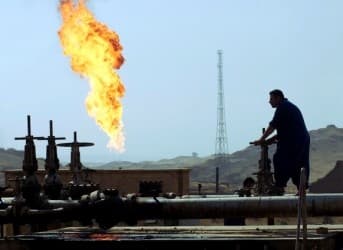One year after U.S. forces left Iraq, oil production is such that the country is situated behind only Saudi Arabia among OPEC member states. New export infrastructure in the south of the country has in part led to a 400,000-barrel production increase since last year. Iraqi oil production, however, has declined since September because of tensions between the Kurdish administration in the north and the central government in Baghdad. With the country marching toward April elections, and amid fresh warnings of heightened political tensions, Iraq, almost a full decade after the war began, lives still in Saudi Arabia's oil shadow. With no U.S. overseer, historic political tensions are as much to blame as war.
The U.S. Energy Information Administration finds that members of the Organization of Petroleum Exporting Countries produced, on average, 30.4 million barrels of crude oil per day in November. Iraq, for its part, has increased its production by 400,000 bpd since last year as it pushes toward its goal of 2.9 million bpd for 2013. OPEC crude oil production, however, was down from last year despite gains from member states Iraq and Libya. For Iraq, though, crude oil production has declined since September because of tensions between the semiautonomous Kurdistan Regional Government and the central administration in Baghdad. Nevertheless, Baghdad aims to increase its production by 10 percent of its November level of 2.62 million bpd as more foreign investors come into Iraq.
Iran has lost a substantial amount of its market share because of tightened international sanctions. There, production has declined by an estimated 50 percent. For Libya, oil production is about 200,000 bpd shy of what it was producing in the last full year of Moammar Gadhafi's government. Protests and lingering security challenges there may handicap Tripoli's ability to attract the major investments needed to rebuild an oil infrastructure razed by war. That instability gives Iraq room to make advances on Saudi Arabia in terms of production kings among the 12 members of the OPEC cartel. With Asian economies looking to make up for lost Iranian crude, it's Iraq's game to lose.
Protesters last weekend waved the Iraqi flag from the era of Saddam Hussein while chanting slogans against sitting Prime Minister Nouri al-Maliki. Internal tensions were raised last week when 10 members of the security team for Finance Minister Rafia al-Issawi were arrested on terrorism charges. One year ago, as U.S. forces were preparing to leave the country, Issawi accused Maliki of working to "build a dictatorship," adding that "someone else" should be prime minister of the new Iraq. In September, Iraqi Vice President Tariq al-Hashemi, a Sunni, was sentenced to death on charges he was operating a death squad in the country. The same day of the sentencing, at least 92 people were killed in a series of attacks through all parts of the country.
Recently, a top adviser to U.S. Vice President Joe Biden said Washington's interests in Iraqi affairs "have increased" since American boots left the ground. Washington, since engagement began in the early 2000s, has envisioned a stable and united Iraq that's open for business. But business so far has pivoted away from American interests. China Petrochemical Corp. aims to double the amount of oil it gets from Iraq next year. A decision by Russian oil company Lukoil to stay out of Iraq's West Qurna-1 field in the south, meanwhile, means China National Petroleum Corp. can now fill a vacuum left by U.S. supermajor Exxon Mobil. Exxon is leaving West Qurna to focus on Kurdish developments, a unilateral move that Baghdad considers illegal. Sami al-Askari, a Maliki ally in Parliament, said Exxon would "face the Iraqi army" should it start work in the north.
Iraqis head to the voting booth again in April. The last round of elections left Iraq divided to the point that records were set in terms of political stalemates. Now, there are already signs that Maliki is seeking to tighten his grip on power further, a move that could lead to even further violence. Last week, one of the few leaders in Iraq with strong bridge-building abilities, Iraqi President Jalal Talabani, suffered a stroke that left his political future in doubt. Before the president slipped into a coma, the prime minister's ally, Askari, said the administration in Baghdad didn't want a war on its hands, but would fight one "for oil."
By. Daniel J. Graeber of Oilprice.com

















